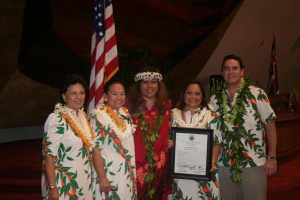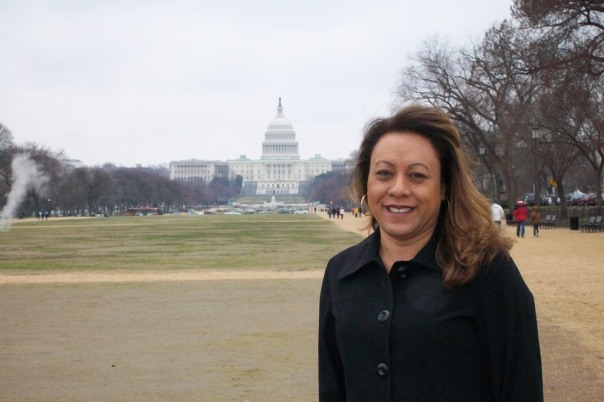For Molokai Dispatch This Legislative Session has brought to the forefront many Hawaiian issues thanks in part to active participation by the community and an increasing effort to educate our lawmakers.
Last week, the University of Hawai‘i at Hilo Student Association collected 1,042 signatures of UH Hilo students urging the Hawai‘i State Legislature to pass a moratorium to prohibit the State and the Lingle Administration from selling “ceded lands.”
This legislative session also saw Hawai‘i’s commitment to ensuring taro security when the House Committee on Hawaiian Affairs received over 500 testimonies in support of a bill to prohibit the development, testing, propagation, release, importation, planting or growing of genetically modified taro in the State of Hawai‘i.
As part of the Hawaiian Caucus Day celebration on March 24, 2009, an O‘ahu Taro Festival hosted by KAHEA and Na Kahu o Haloa in collaboration with the Legislative Hawaiian Caucus was held on the ground floor rotunda of the State Capitol. Hundreds arrived to watch taro farmers from throughout the state and participate in the largest unified gathering of Ku‘i Kalo to celebrate Hawai‘i’s living taro traditions.
In a floor presentation during session on the day of the Hawaiian Caucus Day event, I introduced House Resolution 292, which honors the Hawaiian Civic Club of Honolulu’s 90th anniversary and the Association of Hawaiian Civic Clubs’ 50th anniversary. For decades, these outstanding organizations have preserved Prince Jonah Kuhio Kalaniana‘ole Pi‘ikoi’s vision to help Hawai‘i’s young people secure an education that would enable them to compete successfully in the new cultural environment introduced to Hawaii in the 19th century. The Hawaiian Civic Clubs have generated thousands of dollars for higher education opportunities for Hawaiians while perpetuating Hawaiian formal elegance.
There are many other issues that I have taken on to address this session, such as: issuing a commemorative stamp honoring Prince Kuhio; requesting the University of Hawai‘i to meet with the Kanaka Maoli Council on its Sustainability Plan; developing a Kupuna honorary degree program; urging the counties to adopt measures that provide real property tax relief for Kuleana lands; supporting the discussions for a Hawaiian Constitutional Convention; requesting the Department of Human Services to determine the feasibility of increasing Foster Board Payment Rates; providing adequate funding for the Department of Hawaiian Home Lands; urging the President of the United States to adopt the United Nations Declaration on the Rights of Indigenous Peoples; developing a plan to implement replicas of Hawaiian Hale on the State Capitol lawn; asking the University of Hawai‘i to study the feasibility of planting non-GMO kalo in the reflecting pool that surrounds the State Capitol Building; requesting the Office of Hawaiian Affairs to convene a working group to review the system and procedures for the review of Native Hawaiian burial sites; and requesting that the Office of Hawaiian Affairs contract with a nationally respected and objective consulting firm to conduct a study of disparate treatment of Native Hawaiians in Hawai‘i’s criminal justice system.
The following bills that were referred to the House Committee on Hawaiian Affairs that have made it through crossover, will now be deliberated in conference, where lawmakers will work out the differences between the House and Senate drafts as the session comes to a close. The following measures relating to Native Hawaiian issues that will go to conference are:
House Bill 899 – Clarifies and strengthens the Office of Hawaiian Affairs’ bond authority
House Bill 900 – Appropriates funds for the operating budget of the Office of Hawaiian Affairs.
House Bill 1015 – Enables the Department of Hawaiian Home Lands to begin construction on affordable housing projects without having the full and final amount of the capital costs on hand at the beginning of the project.
House Bill 1663 – Prohibits genetic modification of Hawaiian taro in Hawai‘i.
House Bill 1665 – Prohibits the sale of public lands on which government-owned fishponds are located.
Senate Bill 602 – Authorizes funds to support performing arts and restoration of works of art for Bishop Museum and ‘Iolani Palace.
Senate Bill 995 – Resolves claims and disputes relating to the portion of income and proceeds from the lands of the public land trust for use by the Office of Hawaiian Affairs between 1978 and 2008.
Senate Bill 1268 – Permits the Department of Hawaiian Home Lands to assign or transfer county affordable housing credits.
Senate Bill 1677 – Requires majority vote of the House and Senate to disapprove the sale or exchange of state-held lands to non-state entities and requires community briefing prior to the sale or exchange.
It is my goal as the Chair of the House Committee on Hawaiian Affairs to bring to the forefront the many issues relating to native Hawaiians that have been shelved for years. Through our process we will continue to educate, bring awareness, participate in meaningful conversations as well as find solutions to the many unresolved concerns impacting native Hawaiians. It is time to work together, take action and get results. “A’ohe hana nui ka alu’ia.” “No task is too big when done together.” I’m ready for the task, let’s unite and stand together.







